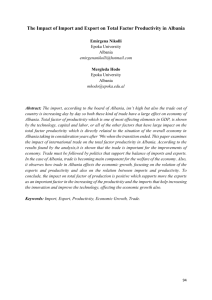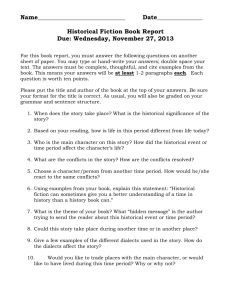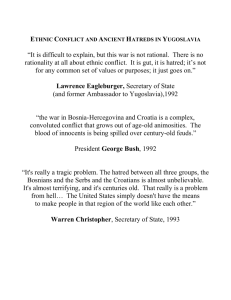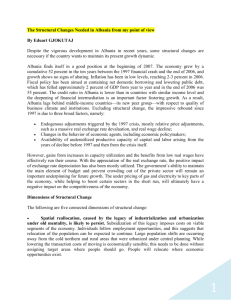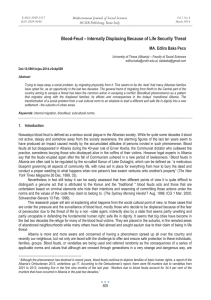Albania Blood Feuds: Asylum Fraud & Media Manipulation
advertisement
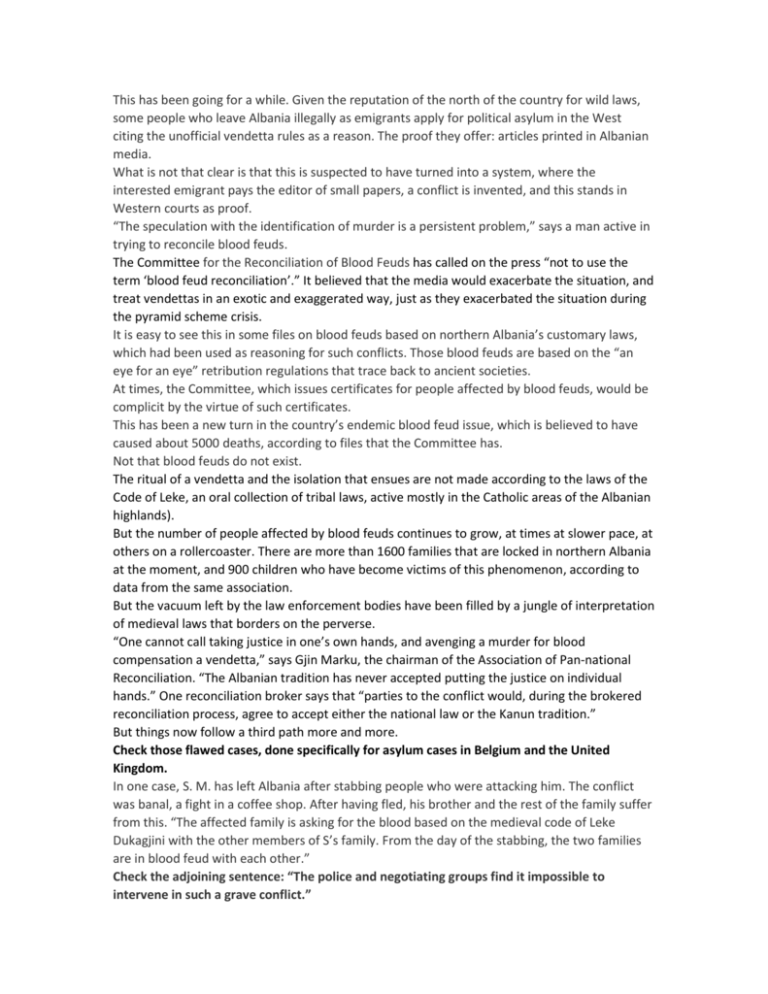
This has been going for a while. Given the reputation of the north of the country for wild laws, some people who leave Albania illegally as emigrants apply for political asylum in the West citing the unofficial vendetta rules as a reason. The proof they offer: articles printed in Albanian media. What is not that clear is that this is suspected to have turned into a system, where the interested emigrant pays the editor of small papers, a conflict is invented, and this stands in Western courts as proof. “The speculation with the identification of murder is a persistent problem,” says a man active in trying to reconcile blood feuds. The Committee for the Reconciliation of Blood Feuds has called on the press “not to use the term ‘blood feud reconciliation’.” It believed that the media would exacerbate the situation, and treat vendettas in an exotic and exaggerated way, just as they exacerbated the situation during the pyramid scheme crisis. It is easy to see this in some files on blood feuds based on northern Albania’s customary laws, which had been used as reasoning for such conflicts. Those blood feuds are based on the “an eye for an eye” retribution regulations that trace back to ancient societies. At times, the Committee, which issues certificates for people affected by blood feuds, would be complicit by the virtue of such certificates. This has been a new turn in the country’s endemic blood feud issue, which is believed to have caused about 5000 deaths, according to files that the Committee has. Not that blood feuds do not exist. The ritual of a vendetta and the isolation that ensues are not made according to the laws of the Code of Leke, an oral collection of tribal laws, active mostly in the Catholic areas of the Albanian highlands). But the number of people affected by blood feuds continues to grow, at times at slower pace, at others on a rollercoaster. There are more than 1600 families that are locked in northern Albania at the moment, and 900 children who have become victims of this phenomenon, according to data from the same association. But the vacuum left by the law enforcement bodies have been filled by a jungle of interpretation of medieval laws that borders on the perverse. “One cannot call taking justice in one’s own hands, and avenging a murder for blood compensation a vendetta,” says Gjin Marku, the chairman of the Association of Pan-national Reconciliation. “The Albanian tradition has never accepted putting the justice on individual hands.” One reconciliation broker says that “parties to the conflict would, during the brokered reconciliation process, agree to accept either the national law or the Kanun tradition.” But things now follow a third path more and more. Check those flawed cases, done specifically for asylum cases in Belgium and the United Kingdom. In one case, S. M. has left Albania after stabbing people who were attacking him. The conflict was banal, a fight in a coffee shop. After having fled, his brother and the rest of the family suffer from this. “The affected family is asking for the blood based on the medieval code of Leke Dukagjini with the other members of S’s family. From the day of the stabbing, the two families are in blood feud with each other.” Check the adjoining sentence: “The police and negotiating groups find it impossible to intervene in such a grave conflict.” “We do have our files for every case,” says the chairman of the Committee. “We exchange continuous information with the police in Western countries, for cases they want to verify.” Another case, this published in a newspaper, talks about two youths from the area of Nenshkodra who eloped out of Albania, and live there illegally because the former fiancé of the girl, Drane K., is seeking revenge. The conflict allegedly started in 2006. “For reasons, including those mentioned in the Code of Leke, the previous fiancé did not accept the fact that the girl should marry someone else.” What ensue are armed ambushes, escapes and more ambushes. Unless one checks the source: a local newspaper in Albania. The same newspaper runs this piece: N. F. Has, for political reasons, left Albania, because after supporting the candidate of one party, he has been attacked by unknown persons. This, according to the newspaper, “has forced N. F. to leave the country from the fall of 2005.” The trick was to claim that N. F. had been supposed to have supported the party that lost the elections, and hence, thugs of the party that won them would attack him. What the newspaper did not write, is that N. F. had see-sawed between two political parties he would use to apply for political asylum in the west, as the election process that year dragged on. Such tricks, which seem to play their role, come at a price. Anonymous sources admit that the fee to run in a newspaper such stories that have been made up, or blown out of their real proportions. All have this tug line “revenges based on the code of Leke.” Getting the hard facts rights would be the first duty of an purports to deal with with the issue of blood feuds, but here starts the problem. At times, government statistics contradicts those claimed by non-governmental organizations. Last May, the Police of Kukes Region said that the number of the families that had locked themselves in their houses in the district of Tropoja amounted to ten, but a report in the local press mentioned 290 such families for the same area. Only seven percent of the blood feuds emerging in Albania after the collapse of communism in the early 90s are based on old conflicts, according the Reconciliation Committee. The rest are new conflicts coming from what happened in the country after 1990. Social conflicts in Albania in the 90s came mostly because of robberies, property disputes, weapons, drugs and prostitution trafficking, and they created a more fertile ground for murder, revenge and vendettas. This also happened in the southern part of the country, where the phenomenon did not exist. Property disputes in the Nenshkodra and Zadrima areas had involved 1600 families in strifes that brought violent conflicts. “Such problems have made our work harder,” they say at the Committee of Reconciliation in Shkodra. Some families involved in such conflicts are even related to each other. Some of 4500 families affected by the women trafficking have also been affected by the blood feuds. The committee calls them “a new contingency.” And the isolation of people is not the only element that can set them apart as vendettas. There are also other associations and groups now that broker or mediate among conflicting families with the intention of ending the blood feud cycles, old and new. There are also selfproclaimed brokers acting at local level who interpret the conflicts according to the customary rules of the local area itself. In Lezha, a doctor was forced to pay a hefty amount of money to end a conflict that an uncle of his father had started. He had also served as a member of the local mission of reconciliation. "The Kanun says that a family can end vendetta in exchange of money or property,” says an expert of reconciliations. “But what is happening is in many cases a speculation.” The Committee itself has a troubled history. It started in 1991 to face hundreds of conflicts that brought about the vendetta-imposed isolation for 2300 families. In 1998, a leader of the Committee emigrated to Canada, saying he was threatened, but amid widespread allegations that the funds of the association had been squandered under his stint. In 2001, it is forced to hold an extraordinary after the murder of Emin Spahia, its new chairman. In end-2005, the Committee implied that $40 million for projects of rehabilitation of families involved in vendettas had been squandered by other organizations instead of being put to good use. "Our work is noble, but it is hard to do much work with the funds I have,” says Marku. The Norwegian government and the United Nations have given $40,000 to the Committee for its work. The government has tried to do something. In 2001, the parliament amended the Criminal Code to include that blood feud murders would be sentenced with at least 20 years in jail, and a maximum of a life sentence. "There are 700 families who show they will give up on vendettas if the perpetrator is given a due punishment by the state,” a document of the Committee shows. "There is no doubt that a great part of the court rulings prolong the conflicts,” says Marku. Only a few days ago, after a district court ruling for a double murder committed last December 24 in Velipoja, A. Zefi was sentenced with 24 years in jail. "He deserved a life sentence,” a relative of the victim said. “We will establish justice ourselves.” Artan Bizhga The research for this story was enabled by the International Media Support and the Danish Association of Investigative Repoters (FUJ).

